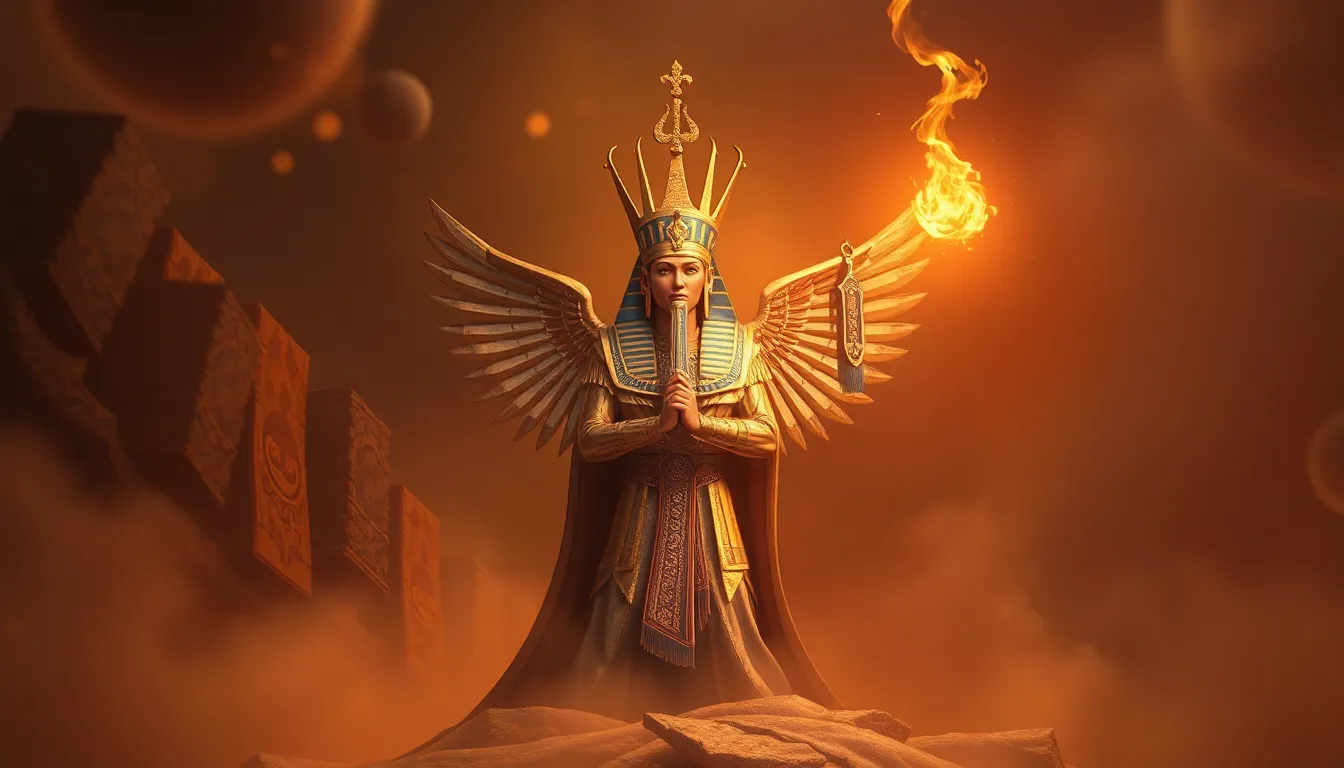The Concept of Divine Kingship in Egyptian Mythology
I. Introduction
Divine kingship is a fundamental concept in ancient Egyptian culture, signifying the belief that the Pharaoh was not only a political leader but also a divine entity. This idea was crucial in maintaining the social and political order of ancient Egypt. The Pharaoh was considered a living god, acting as an intermediary between the gods and the people, which reinforced his authority and influence.
The importance of divine kingship in ancient Egyptian society cannot be overstated. It shaped their governance, religious practices, and societal norms. In this article, we will explore the historical context, theological foundations, symbolism, rituals, authority, decline, and the legacy of divine kingship in ancient Egypt.
II. Historical Context of Divine Kingship
The emergence of divine kingship can be traced back to Early Dynastic Egypt (circa 3100-2686 BCE) when the first Pharaohs consolidated power and established the concept of a divine ruler. The role of the Pharaoh evolved over the centuries, adapting to changing political landscapes and religious beliefs.
- Early Dynastic Period: The unification of Upper and Lower Egypt under the first Pharaohs marked the beginning of divine kingship.
- Old Kingdom: The Pharaoh was viewed as a god-king, responsible for maintaining harmony and order.
- Middle and New Kingdoms: The role of the Pharaoh became more complex, incorporating military leadership and diplomacy.
When comparing divine kingship in Egypt to other ancient civilizations, such as Mesopotamia or Mesoamerica, we find similarities in the idea of a ruler being divinely appointed. However, the Egyptians uniquely emphasized the Pharaoh’s role as a direct descendant of the gods, particularly Horus, enhancing his divine status.
III. Theological Foundations of Divine Kingship
The theological underpinnings of divine kingship are deeply rooted in ancient Egyptian religion. The gods played a crucial role in justifying the Pharaoh’s rule, with each Pharaoh believed to be chosen by the gods to uphold cosmic order.
- The Role of Gods: Key deities such as Osiris, Isis, and Horus were integral in legitimizing the Pharaoh’s authority.
- Concept of Ma’at: Central to Egyptian belief, Ma’at represented order, truth, and justice. The Pharaoh was responsible for maintaining Ma’at in society.
- Mediator Role: The Pharaoh acted as a mediator between the gods and the people, ensuring that divine favor was bestowed upon the land.
IV. Symbolism and Iconography of Divine Kingship
Symbols associated with Pharaohs served to reinforce their divine status. The Ankh, Crook, and Flail are some of the most notable symbols that represented life, authority, and power.
- Ankh: Symbol of life and immortality.
- Crook and Flail: Representing the Pharaoh’s role as a shepherd and protector of his people.
Artistic representations of the Pharaoh in temple reliefs and statues often depicted him in a way that emphasized his divine nature. Royal names and titles, such as “Son of Ra” and “Lord of Two Lands,” further illustrated his connection to the divine and his authority over Egypt.
V. The Rituals and Ceremonies of Kingship
Rituals played a vital role in reinforcing the divine kingship of the Pharaoh. The coronation ceremony was a significant event, marking the Pharaoh’s ascension to the throne and his divine authority.
- Coronation: A sacred rite that involved various rituals to invoke the blessings of the gods.
- Heb Sed Festival: A celebration that reaffirmed the Pharaoh’s strength and vitality, typically occurring after 30 years of reign.
- Maintaining Ma’at: Rituals were performed to ensure that the Pharaoh retained divine favor, including offerings to the gods.
- Role in Religious Festivals: The Pharaoh participated in various festivals, emphasizing his role as a divine figure and a protector of the land.
VI. The Pharaoh’s Divine Authority and Governance
The Pharaoh’s dual role as a political leader and a divine being shaped the governance of ancient Egypt. His responsibilities extended beyond mere politics; he was expected to maintain order and prosperity throughout the land.
- Political Leadership: The Pharaoh’s decisions were seen as divinely inspired, granting him absolute authority.
- Responsibilities: Ensuring the welfare of the people, managing resources, and leading military campaigns were crucial aspects of his reign.
- Impact on Law and Society: Laws were often viewed as manifestations of divine order, and the Pharaoh’s role in enforcing these laws was paramount.
VII. Decline of the Concept of Divine Kingship
The concept of divine kingship began to erode due to various factors, including shifts in religious beliefs and political structures. The rise of powerful priesthoods and external invasions contributed to this decline.
- Erosion of Authority: The growing power of priests diminished the Pharaoh’s role as the sole mediator between gods and people.
- Changes in Beliefs: The introduction of new religious ideas and practices altered the perception of the Pharaoh’s divine role.
- Political Shifts: Foreign invasions and rule by foreign dynasties led to a significant transformation in governance.
Despite the decline, the legacy of divine kingship continued to influence later Egyptian history and culture, reflecting the enduring significance of the Pharaoh’s divine authority.
VIII. Conclusion
In summary, divine kingship was a cornerstone of ancient Egyptian civilization, intertwining religion, governance, and societal structure. The Pharaoh’s role as a divine ruler not only legitimized his authority but also established a framework for maintaining order and justice in society.
The influence of divine kingship can still be observed in modern culture, particularly in literature and art that draws inspiration from ancient Egypt. Understanding this concept is essential for grasping the complexities of ancient Egyptian society and its enduring legacy.
Ultimately, the concept of divine kingship offers profound insights into the interplay between religion and politics in ancient civilizations, reminding us of the powerful role that belief systems play in shaping societies.




